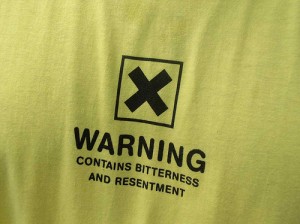Step 4: “Made a searching and fearless moral inventory of ourselves.”
 I think the number one issue that affects writers more than any other emotion is fear. Blind, raging fear. And in the writing world, well, being fearless is a necessity. Or at least finding the courage to walk through our fears. That can be rough.
I think the number one issue that affects writers more than any other emotion is fear. Blind, raging fear. And in the writing world, well, being fearless is a necessity. Or at least finding the courage to walk through our fears. That can be rough.
However, if we really examine our fears, a lot of the time we can see they are unreasonable or completely unwarranted. So this is why I think the heart of the 4th step is the fear inventory. The “grudge list”, or resentment inventory gives us our fears laid out right down the line because a lot of the time fear hides itself as resentments, but not always.
I start my fear inventory with all the fears I have with resentments. And then I lay them out on paper. Here are the columns.
| Fear | History of Fear | Self-Reliance Failed Me | Please | Marching Orders |
| Name the fear. | Write down a brief history of the fear. | In what ways have I tried to deal with the fear myself with no help from the Divine? | Ask the Divine to remove this fear. | What are my marching orders? What kind of person does the Divine want me to be? |
In this way, we can see the roots of the fear and then how we’ve tried to deal with the fear. Generally, I try and ignore the fear, hoping it will go away. Typical man. No, I won’t go to the doctors, I’m fine. My compound fracture will heal if I just ignore it.
What’s interesting for me is that a lot of fears have no history. I have an overactive imagination so I can imagine the horrible things but generally, they never come to pass. Other fears have roots in my childhood. The world can be cruel to a child. And kids can be downright evil to the people around them.
Now, I have a hard time with the “God” idea, so I used the Divine. For me, it carries less weight than God. The Divine also seems bigger, more unknowable, and will this Divine Other help me? I don’t know. But I can pretend it can. Why not?
So I ask the Divine to remove my fear and then I get my marching orders. What kind of person does the Divine want me to be?
This is the meat of the whole inventory process. What is my ideal around this area? And then how I can strive for that ideal?
Next week I’ll take the fear I had from my resentment example and we’ll inventory it together. Never alone. Never again.






